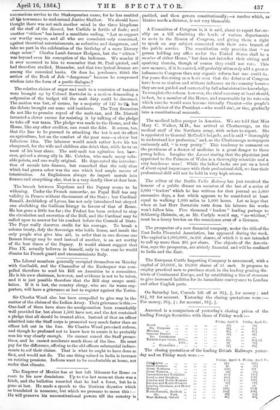The relative claims of sugar and malt to a remission
of taxation were brought up by Colonel Barttelot in a motion demanding a suspension of the budget till the malt duty could be discussed. The motion was lost, of course, by a majority of 347 to 9a, but the debate brought out some odd incidents. The Tory financiers do not like to promise repeal of the malt-tax, and Mr. Disraeli invented a clever excuse for resisting it by talking of the pledge to take off war taxes. The pledge was made to the house, and the House, like any other creditor, can remit the debt. It seems, too, that the line to be pursued in attacking the tax is not its effect on agriculture, but on the comfort of the poor man—a clever but fallacious idea. The labourer would much rather have his tea cheapened, for the wife and children also drink that, while he ta'tes most of his beer alone. The anti-malt tax agitation has, how- ever, gained a strong ally in Mr. Cobden, who made many valu- able points, and one really original. He deprecated the introduc- tion of morals into finance, but remarked that the only class which had grown sober was the one which had ample means of intoxication. As Englishmen always do import morals into finance and everything else,-that is a very deadly blow at dear beer.






























 Previous page
Previous page